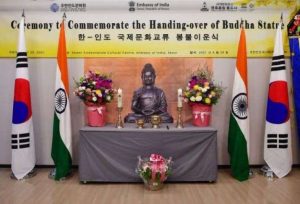
This essay retells in English the contents of some Pali Canon excerpts, originally translated by Bhikkhu Thanissaro, and Bhikkhu Khantipalo, describing how an aspirant—constantly striving, with attentive awareness, clear concentration and persistent endurance—continues to make progress on the Path.
As word-for-word translations can be awkward, due to differences in language, sound, sense, connotation, syntax, and imagery, in what follows, I shall paraphrase a prose rendering of some texts explaining persistence.
As if stitching a petit-point design over a pre-embossed pattern, I have expanded and condensed the wording, and presented most passages in indirect, speech to make the language flow more smoothly and coherently.
First, let’s cover some texts by Bhikkhu Thanissaro:
A monk should live a wandering life, being ever-mindful of abandoning sensual passions, as if he had been struck by a sword or as if his head were burning with fire. (See Thag 1.39)
This Dhamma is for one whose persistence is aroused and not for one who is lazy. A monk keeps his persistence aroused for abandoning unskillful mental qualities and for taking on skillful mental qualities. He is persistent, firm in his effort, and does not shirk his duty. (See AN 8.30)
There are the five factors concerning exertion.
[i] There is a case where the monk has conviction. He is convinced of the Tathagata’s awakening, and thinks: “Indeed, the Blessed One is worthy and rightly self-awakened, consummate in knowledge and conduct, well-gone, an expert with regard to the world, unexcelled as a trainer for those who are fit to be tamed, the Teacher of divine and human beings, awakened, blessed.”
[ii] The monk is free from illness and discomfort. He is endowed with good digestion, not too cold or hot, with moderate energy and mindful-exertion.
[iii] He is neither deceitful nor duplicitous. He speaks clearly to his teacher and wise friends in the holy life, telling the truth—the way it is.
[iv] He keeps persistence aroused, abandoning unskillful qualities and maintaining skillful qualities. He is persistent in mind and constant in exertion, not shirking the duty of embodying skillful mental qualities.
[v] He is endowed with discernment, leading to the arising of the noble goal, of penetration leading to the end of suffering. (See AN 5.53)
The monk feels pleasure and delight in developing skillful qualities and in abandoning unskillful qualities. He does not, due to the pleasure and delight of developing and abandoning, think too highly of himself nor lay blame on others. In practice, he is diligent, adept, alert and mindful, standing firm in the ancient tradition of the noble ones. (See AN 4.28)
And how is a monk devoted to wakefulness?
There is the case where, during the day, a monk, while sitting, and while pacing back and forth, cleanses his mind of qualities hindering development.
During the first watch of the night, from dusk until 10 p.m., sitting and pacing back and forth, he cleanses his mind of qualities hindering development.
During the second watch of the night, from 10 p.m. until 2 a.m., reclining on his right side, he takes up the lion’s posture, placing one foot on top of the other, mindfully alert, with his mind set on getting up at a set time when he awakens.
During the last watch of the night, from 2 a.m. until dawn, sitting and pacing back and forth, he cleanses his mind of unskillful qualities thus holding the mind in check. So a monk is devoted to wakefulness. (See AN 4.37)
•••
Secondly, let’s cover Bhikkhu Khantipalo’s text on The Striving of Gotama, Padhana Sutta, Snp 3.2, also somewhat loosely paraphrased.
The Buddha: When I was absorbed, persistently striving to subdue myself beside the river, Neranjara, seeking to gain surcease of sorrow, Namuci, approached and spoke to me, in words of apparent compassion.
Mara: I see that you are thin and pale, seeming to be near death, with a thousand parts of life pledged to death, and just one part holding on to you.
Live, sir! To live is better. Gain merit by living! Come! Live and enjoy life. Pour libations upon the holy fires to gain merit.
Why struggle further? Such struggle is rough, too difficult and hard to bear.
Narrator: As Mara, was speaking, he kept coming closer, as The Blessed One replied to him.
The Buddha: Evil One, you have come for your own purposes. Why such merit?
I don’t need that kind of merit. So, Māra, go and talk of to those who’ll listen.
I have faith and energy, and understanding, so, while I am subduing myself, why you speak about living and enjoying?
As a wind blows which dries up even running rivers, so while I’m subduing myself, why not let such a wind dry up my blood? So as the blood dries up, even the bile and phlegm dry up too! But, even such a wasting-away calms my mind, so it becomes tranquil and my attention, comprehension, and meditation also become unshakeable.
By striving, I have come to know the limitation to which such sense-feeling reaches. My mind does not seek satisfaction in sense-desire, so rather than seeking sense-satisfaction, I have become actually more and more pure.
Your first army is sense-desire, your second is sense-dissatisfaction, third is hunger and thirst, fourth is craving, fifth is sloth and drowsiness, sixth is fear, seventh is skeptical doubt, and eighth is hypocrisy and stupor.
Gaining honor, praise, notoriety ill-won, self-praise, and defamation. These are your armies, the Black One’s fighting troops. None but the brave could conquer them and attain bliss. It’s as if I’m weaving mats of long stalks of grass to protect myself, and proclaiming no retreat, and not feeling shame caused by defeat. Better to die in battle now than to choose life in defeat. There are ascetics and brahmins who have given up worldly wants, who are then seen no more because Death does not know the path they take.
Seeing Mara’s armies and elephants arrayed all around, I’ll foray forth to fight and never be driven from my post. By using the sharp weapon of wisdom, which the sense-world with all its gods cannot defeat, I’ll scatter and disarray your close-ranked squadrons—the way a raw clay pot is shattered into pieces by a thrown stone.
With well-established mindfulness, with mind’s thoughts well-focused, I’ll travel on from state to state, leading my diligent disciples, who are by now resolute enough to carry on my Sasana—and whether you like it not, Mara, my followers will also go to where they do not grieve.
Mara: I’ve followed the Blessed One, the Fully Enlightened One, for seven years; however, his persistent mindfulness, has given me no chance to win.
There was a crow who walked around a stone that looked like a lump of fat, and the crow asked: “Can I find something soft in this? Is it tasty?”
However, finding nothing tasty to satisfy him, Mara, the Dark One, quietly walked away, thinking: “We depart from Gotama in disappointment, like the crow who tried to bite the stone.”
Narrator: Full of sorrow, Mara let the lute slip down off his arm and the dejected demon disappeared.
See more
Sutta Nipāta (budaedu.org)
Related features from BDG
The 10 Qualities of Protection
Food for the Mind
Sixteen Poisons Polluting the Mind
Fire Imagery in the Pali Canon














